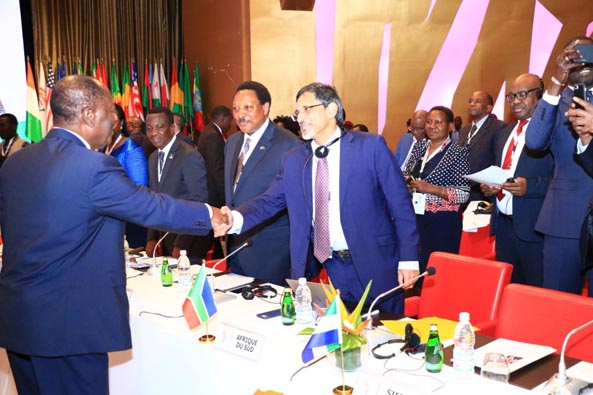SA Calls for Digitisation as Strategy to Unify African Economies |
| Africa can address the challenges of geography with a smart digital strategy that can connect economies and help industrialise the continent. This was the message from Minister of Trade and Industry, Mr Ebrahim Patel at a dialogue in Côte d’Ivoire. Minister Patel was co-chairing a session of the African Growth and Opportunities Act (AGOA) with the United States Deputy Trade Representative, Ambassador CJ Mahoney.
Minister Patel said that digitisation provides opportunities for industrialisation, job creation, entrepreneurship, economic development and tax collection to fund social programmes. “Data is to the 21st century what oil and steel was to the 20th century. Africa must become more than a consumer market for digital services produced elsewhere. We must become innovators and producers too, exporting services and building capabilities,” he said. However, Patel noted that the process of digitisation was uneven as many countries, including those in Africa, lag behind and contribute to a digital divide. “Technology is a potential platform for leap-frogging. Securing its benefits and realising its promise, will require well-designed and purposeful public policy measures to promote data for development. It also requires a deep partnership with entrepreneurs and young people who develop the technologies that are changing our world,” he said. He noted that technological advances offered a range of potential solutions to many social, economic and development challenges confronting African countries. Minister Patel added that the technological change could also be disruptive within societies and economies. “We live in the age of innovation, a great age for humanity, with digital technologies and digital transformation changing every part of human life, from how we produce, consume, play, and engage socially,” he said. He noted that governments needed to consider appropriate public policy, legislative and regulatory measures that may include competition, tax, labour market, SME-promotion, privacy and national security measures. He added that the private sector should take initiatives to use technology to expand economic inclusion and growth.
Enquiries: |
MENUMENU
- Know the dtic
- Media Room
- Financial Assistance
-
-
- INCENTIVES
- 12I Tax Allowance Incentive
- Agro Processing Support Scheme (APSS)
- Aerospace Industry Support Initiative (AISI)
- Aquaculture Development and Enhancement Programme (ADEP)
- Automotive Investment Scheme (AIS)
- Black Industrialists Scheme (BIS)
- Capital Projects Feasibility Programme (CPFP)
- Critical Infrastructure Programme (CIP)
- Clothing, Textiles, Footwear and Leather Growth Programme (CTFLGP)
- Export Marketing and Investment Assistance (EMIA)
- Film Incentive
- INCENTIVES
-
- INCENTIVES
- Global Business Service (GBS)
- Innovation and Technology Funding instruments
- Manufacturing Competitiveness Enhancement Programme (MCEP)
- Production Incentive (PI)
- Manufacturing Support Programme (MSP)
- Sector Specific Assistance Scheme (SSAS)
- Strategic Partnership Programme (SPP)
- Support Programme for Industrial Innovation (SPII)
- Technology and Human Resource for Industry Programme (THRIP)
- Workplace Challenge Programme (WPC)
- Khoebo Innovation Promotion Programme (KIPP)
- INCENTIVES
-
-
- Sectors and Service
- Sectors
- B-BBEE
- Special Economic Zones
- Industrial Development
- Trade and Export
- Legislation and Business Regulation
- Bills and Acts
- Statutory Committees
- National Liquor Authority
- Proposed prohibition of the use of certain EU names
- Institutional Support for Business
- South African Council for Space Affairs
- InvestSA
- Non-Proliferation
- The South African Council For Space Affairs
- Procurement and Tenders
- Research and Statistics


